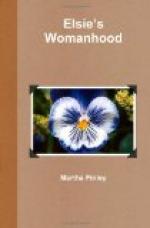“None of us, Allison! No, no! the Union forever!” returned several voices in chorus.
“Hark!”—as the sharp crack of a rifle was heard, and a prisoner who, half crazed with suffering, had, in staggering about, approached too near the fatal line and laid a hand upon it, fell dead—“another patriot soul has gone to its account, and another rebel earned a thirty days’ furlough.”
The dark eyes of the speaker flashed with indignation.
“Poor fellows, they don’t know that it is to preserve their liberties we fight, starve, and die; to save them from the despotism their ambitious and unscrupulous leaders desire to establish over them,” remarked Harold Allison; “how grossly the masses of the Southern people have been deceived by a few hot-headed politicians, bent upon obtaining power for themselves at whatever cost.”
“True,” returned the other, drily; “but it’s just a little difficult to keep these things in mind under present circumstances. By the way, Allison, have you a sister who married a Mr. Horace Dinsmore?”
“Yes, do you know Rose?” asked Harold, in some surprise.
“I was once a guest at the Oaks for a fortnight or so, at the time of the marriage of Miss Elsie, Mr. Dinsmore’s daughter, to a Mr. Travilla.”
Harold’s face grew a shade paler, but his tones were calm and quiet. “Indeed! and may I ask your name?”
“Harry Duncan, at your service,” returned the other, with a bow and smile. “I met your three brothers there, also your sisters, Mrs. Carrington and Miss May Allison.”
The color deepened slightly on Harry’s cheek as he pronounced the last name. The pretty face, graceful form, charming manners, and sprightly conversation of the young lady were still fresh in his memory. Having enjoyed the hospitalities of Andersonville for but a few days, he was in better condition, as to health and clothing, than the rest of the group, who had been there for months.
“Harry Duncan!” exclaimed Harold, offering his hand, which the other took in a cordial grasp and shook heartily, “yes, I know; I have heard of you and your aunt, Miss Stanhope. I feel as if I’d found a brother.”
“Thank you; suppose we consider ourselves such; a brother is what I’ve been hankering after ever since I can remember.”
“Agreed,” said Harold. “Perhaps,” he added, with a melancholy smile, “we may find the fiction turned to fact some day, if you and one of my single sisters should happen to take a fancy to each other; that is, if we live to get out of this and to see home again.” His tone at the last was very desponding.
“Cheer up,” said Duncan, in a low, sympathizing tone, “I think we can find a way to escape; men have done so even from the Bastile—a far more difficult task, I should say.”
“What’s your idea?”
“To dig our way out, working at night, and covering up the traces of our work by day.”




